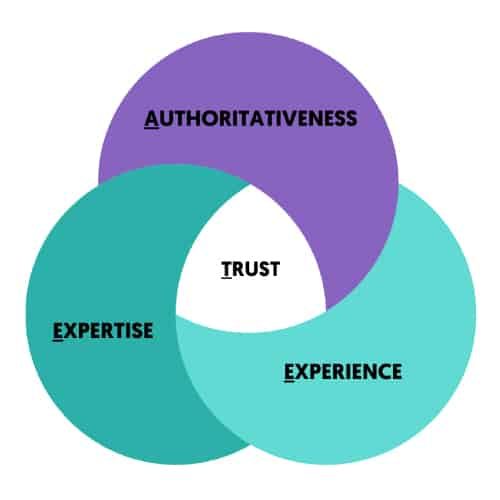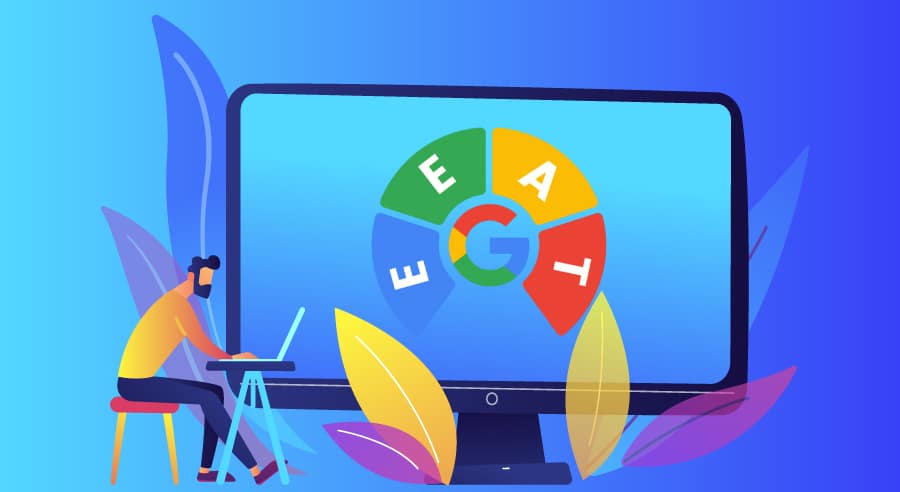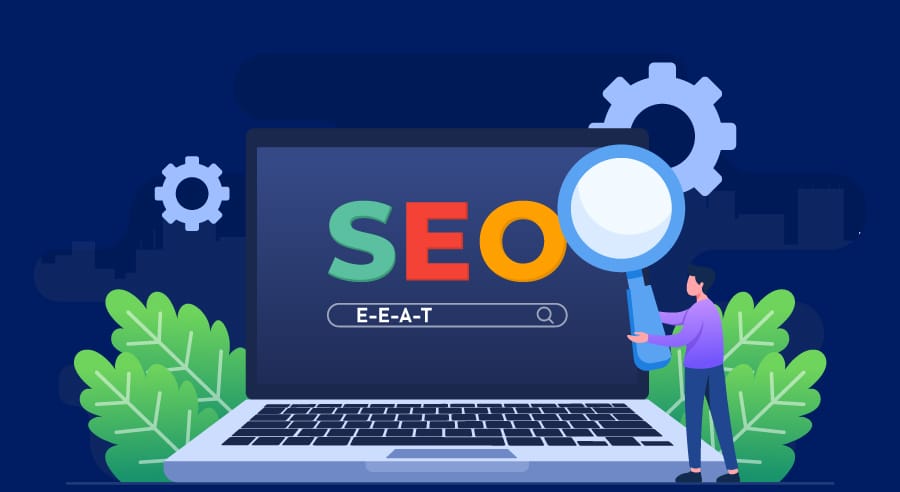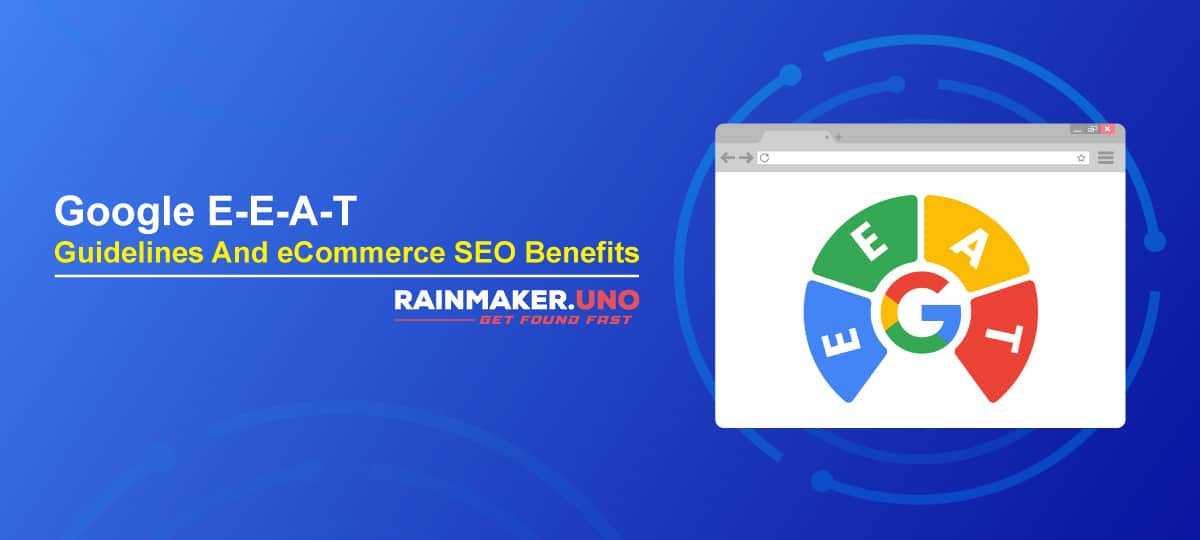Now that you know E-E-A-T, its components, and how it works, start implementing it in your content strategy.
The E-E-A-T guidelines summarize everything that search engines look for in a good website, so it’s important that your website complies with them.
What are you waiting for?
Get started with E-E-A-T, strengthen your marketing efforts, and get a profitable return on investment.
Google officially introduced Experience, Expertise, and Authoritativeness (E-A-T) in its Search Quality Evaluator Guidelines 2014, which made it a standard for content quality and ranking.
Later, in December 2022, E-A-T became E-E-A-T, with an additional “Experience” factor highlighting the direct experience in creating credible and high-value content.
E-E-A-T stands for Experience, Expertise, Authoritativeness, and Trustworthiness and is used by Google to measure the quality of your website content.
It helps the search engines to ensure that only reliable and valuable information appears at the top of search results, boosting trust among the audience.
But what are E-E-A-T guidelines, and how can they be used in online businesses?
Let’s discuss everything about E-E-A-T and some tips on creating remarkable content within this framework to rank well on SERPs.
Principles Of Google E-E-A-T

While the Google algorithm may sound complicated, the E-E-A-T framework can greatly help elaborate how it analyzes a webpage.
Google E-E-A-T comprises four elements that contribute to a page’s quality.
1. Experience
To create compelling content, a creator must truly understand the topic and have real-world experience. This provides authenticity and deeper insight into the topic to the readers.
For example, a product review written by someone genuinely using the product is far more credible and reliable than a review from someone without direct experience.
Adding “Experience” to your content allows the creator to offer insights, address possible challenges, and provide feasible examples and solutions that resonate with the audience. This makes your content relatable, enhancing its impact and value.
2. Expertise
Google looks for authors with experience and relevant credentials, training, and qualifications.
Experience is often confused with expertise, but both are different.
While experience refers to real-life exposure or experience of an author with the subject, expertise refers to the author’s deep knowledge of the topic.
For example, if the search is about a personal blog about experiences regarding DIY home renovations, it would represent hands-on experience. On the other hand, if it’s a blog about types of materials to use in home projects, readers would prefer a guide from a certified contractor who demonstrates the highest level of expertise.
Both types of content are valuable, but they meet different criteria when Google assesses them.
3. Authoritativeness
Authority refers to the respect and credibility of a person or a website, particularly within their field.
To confirm the authority, Google thoroughly examines the web to find out what others say about the website or person. It looks for references and endorsements from sources not directly affiliated with the site or individual in question.
For example, the dietary guidelines recommended by a reputed health organization are regarded as a primary, authoritative source in the medical community.
4. Trustworthiness
Trustworthiness means a website and its information should be legitimate, precise, and dependable.
There are numerous indicators of trustworthiness, such as
- Providing transparent identification of the content creators, including their contact details on the website.
- Checking the validity of the content and whether the information comes from reliable sources.
- Security of the website
- Reviews and ratings
Strategies To Improve E-E-A-T

Improving your content with E-E-A-T is essential for improving search rankings. Here are a few strategies that can significantly boost your content engagement and authority.
1. High-Quality Content
Google’s algorithms prioritize well-written, informative content that offers concise, relevant responses to user inquiries.
Here are some tips:
- Write clearly in a formal yet conversational tone. Ensure that your information is punctuated correctly and follows proper grammar.
- Use bullet points, subheadings, and headings to organize your text and highlight important details.
- Provide insightful and targeted content rather than including unnecessary information or intrusive advertisements.
- To increase credibility and foster confidence, include outbound links to pages with authority and cite credible sources.
- To increase the authority of your information, use backlinks in your content by requesting endorsements from other reputable websites.
- Stay updated with the recent standards and procedures to prevent misinformation and ensure the reliability and correctness of all data.
2. Transparency And Credibility
According to Google Quality Rater Guidelines, there are two key elements that decide the quality rating of a site: transparency and credibility of the content creators.
Here are a few effective ways to boost transparency in your content:
- Add a byline on each post to identify the author and include their biography.
- Create an “About Me” page to show your website’s purpose.
- Ensure there is a contact page with your email address.
- Add a “Meet the Team” page.
- Include your credentials, such as the content creator’s experience, qualifications, awards, or achievements, and display reviews and testimonials about your business.
3. Promote Your Business
Promoting your business helps increase your customer base by reaching out to more people. It is an outstanding tactic for growing your business, as it attracts more people to your brand and increases sales.
Here are some tips to do so:
- Send guest blog articles or opinion pieces to media outlets or other websites to promote your work and build your website’s authority with valuable backlinks.
- Establish a strong social media presence to circulate content and increase website traffic.
- Request contributions from guest authors to grow your internet visibility and link network.
- Interview professionals or esteemed academics to provide informational and inventive content that draws readers in and impresses search engines.
4. Reviews And Ratings
Adding ratings and reviews of your products on sites like Yelp, Google, Trustpilot, or even Facebook is a smart way to increase the legitimacy of the business.
These reviews are important as they increase credibility with search engines, especially Google and customers alike.
It is also essential to respond to these reviews, including the negative ones, as it builds up your brand image and shows your commitment to customer satisfaction.
5. Content Audit
Google loves new content since it shows that you are actively maintaining your website.
Conducting a content audit can help you assess its performance. After the audit, optimize high-performing or valuable content to keep it relevant.
By frequently refreshing and updating your content, you provide value to your audience and earn recognition from Google.
Significance Of E-E-A-T In SEO

E-E-A-T represents a set of factors given below that determine how Google evaluates a website’s quality and credibility.
Compelling Content
Google’s algorithm highly values content that reflects the E-E-A-T principles.
The greater the authority and quality reflected in your content, the higher it will rank. This means that well-written and credible content is significantly promoted on top of SERPs, thereby sending maximum traffic to the site.
Enhanced Customer Experience
Prioritizing E-E-A-T in your content makes it accurate, credible, and reliable, improving the user experience by satisfying search engine algorithms and quality raters.
People tend to believe information from reliable sources. Hence, users are more inclined to return to a website that continually proves its authority and dependability, encouraging repeat visits.
Establishes A Strong Brand Reputation
Creating E-E-A-T content helps businesses attract new customers and give them an idea about your products and services, which builds a strong brand reputation.
The credibility you demonstrate with the help of E-E-A-T attracts customers and fosters loyalty, leading to sustained customer relationships and brand promotion.
Supports Your Marketing Strategies
Incorporating E-E-A-T is essential for your website and marketing platforms, including blog articles, social media updates, and newsletters.
Showing your expertise and experience while establishing trustworthiness and dependability engages your audience and builds a solid, long-lasting brand.
